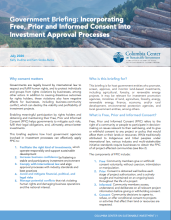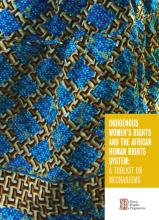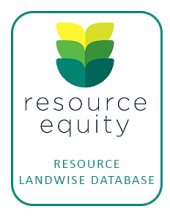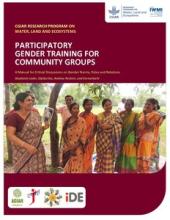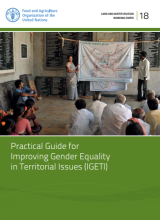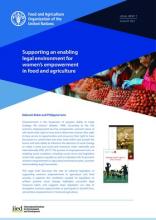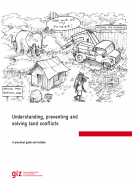Resources for Gender
Governing land for women and men: A technical guide to support the achievement of responsible gender-equitable governance of land tenure
The guide focuses on equity and on how land tenure can be governed in ways that address the different needs and priorities of women and men. It moves away from long-standing debates about gender equality in access to land, towards the mainstreaming of gender issues to achieve more gender-equitable participation in the processes and institutions that underlie all decision-making about land.
Government Briefing: Incorporating Free, Prior and Informed Consent (FPIC) into Investment Approval Processes
This briefing explains how host government agencies involved in investment processes can effectively apply FPIC to:
1. Facilitate the right kind of investments, which operate responsibly and support sustainable development
2. Increase business confidence by fostering a stable and participatory investment environment
3. Comply with international law and align approval processes with industry standards and best practices
4. Avoid and mitigate financial, political, and legal risks
5. Manage potential conflicts that risk violating human rights and damaging business operations and the national interest.
Indigenous Women’s Rights And The African Human Rights System: A Toolkit On Mechanisms
The toolkit has been created in order to introduce indigenous women, and the organisations which represent them, to the African system of human and peoples' rights. It highlights the different routes available to ensuring that the rights of indigenous women are valued and taken into account by the African Commission.
The toolkit is comprised of 11 Information Notes:
International Agreements and How to Build a Legal Case for Women’s Land Rights
This guide aims to help practitioners to research and use international legal norms, regional conventions, treaties and protocols to engage State officials and institutions, including local and customary legal officials; to encourage domestic compliance with State obligations; and to challenge local laws and court decisions regarding women’s rights to land and property. The guide provides the underlying international norms and relevant treaty provisions addressing women’s land rights. It also includes a series of questions focusing on how to build a case challenging local laws or a court decision which violates international or regional commitments that the state has made with regard to women’s land and property rights.
Participatory gender training for community groups
This manual provides a step-by-step description of a gender training workshop. It is for any community mobilizer, non-governmental organization (NGO) staff or researcher who wants to hold a discussion with farmers on gender norms, roles and relations in their communities can use this manual. It has been designed for communities with small-scale farming activities, but by adaping the approach, it could also be used for more urban, non-agricultural settings.
Practical Guide for Improving Gender Equality in Territorial Issues (IGETI)
This guide presents a people-centred gender approach to increase and improve the provision of goods and services from agriculture, forestry and fisheries in a sustainable manner while reducing rural poverty. It first introduces the proposed approach for improving gender equality in territorial issues, with specific guidance for each phase of the gender-response planning process. Then, it presents some available participatory tools to support planning of gender-responsive territorial development. It will be relevant to a broad spectrum of actors: government officials and policy-makers, civil society groups, development practitioners and consultants.
Supporting an enabling legal environment for women’s empowerment in food and agriculture
Empowerment is the “expansion of people’s ability to make strategic life choices”. According to the UN, women’s empowerment has five components: women’s sense of self-worth; their right to have and to determine choices; their right to have access to opportunities and resources; their right to have the power to control their own lives, both within and outside the home; and their ability to influence the direction of social change to create a more just social and economic order, nationally and internationally. The process of empowerment rests on enabling social conditions including social norms and legislative action that supports equality as well as individual will. To promote women’s empowerment in agriculture and food security, countries need enabling legal frameworks.
Toolkit on the Inter-American human rights system for indigenous women
This toolkit contains a series of information notes explaining different aspects of the Inter-American human rights system. It is designed to help indigenous women and their advocates to use the system effectively.
Toolkit on the Inter-American human rights system for indigenous women
This toolkit contains a series of information notes explaining different aspects of the Inter-American human rights system. It is designed to help indigenous women and their advocates to use the system effectively.
Understanding, preventing and solving land conflicts: A practical guide and toolbox
This guide is intended for practitioners who are confronted with land conflicts in the course of their work or are in a position to prevent them and/or include land governance as one pillar in their policies. It aims to broaden the understanding of the complexity of causes that lead to land conflicts in order to provide for better-targeted ways of addressing such conflicts, and provides a number of tools with which to analyse land disputes. In addition, this guidebook discusses a wide variety of options and tools for settling ongoing land conflicts and for preventing new ones. It adopts a gender-sensitive approach.


